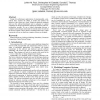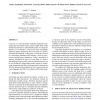789 search results - page 107 / 158 » A Formal Model for Epistemic Interactions |
CHI
2006
ACM
14 years 8 months ago
2006
ACM
It has been well established in Cognitive Psychology that humans are able to strategically adapt performance, even highly skilled performance, to meet explicit task goals such as ...
CHI
1997
ACM
14 years 5 days ago
1997
ACM
MOBI-D (Model-Based Interface Designer) is a software environment the design and development of user interfaces from declarative interface models. End-users informally describe ta...
CODES
2002
IEEE
14 years 29 days ago
2002
IEEE
Design for performance-optimization of programmable, semicustom SoCs requires the ability to model and optimize the behavior of the system as a whole. Neither the hardware-testben...
COORDINATION
2010
Springer
13 years 11 months ago
2010
Springer
Increasing sizes of present-day distributed software systems call for coordination models which are both modular and scalable. Precise modelling of real-life applications further r...
WSC
2007
13 years 10 months ago
2007
Coercion is a semi-automated simulation adaptation technology that uses subject-matter expert insight about model ion alternatives, called flexible points, to change the behavior...


